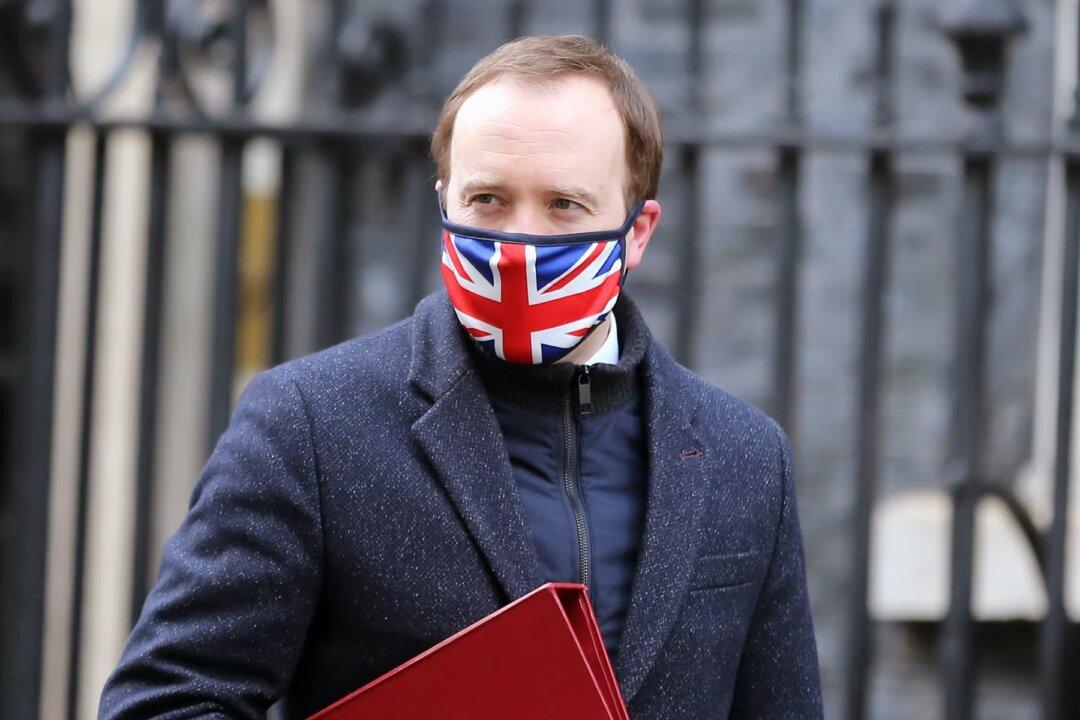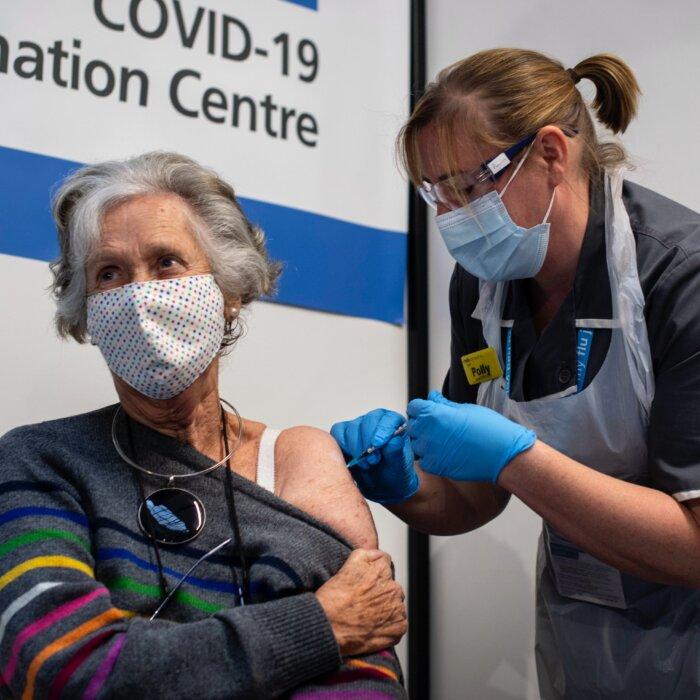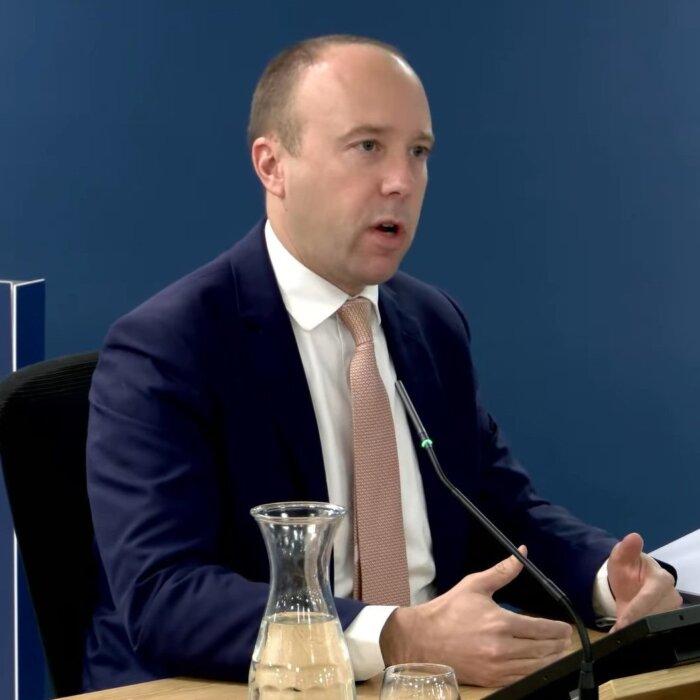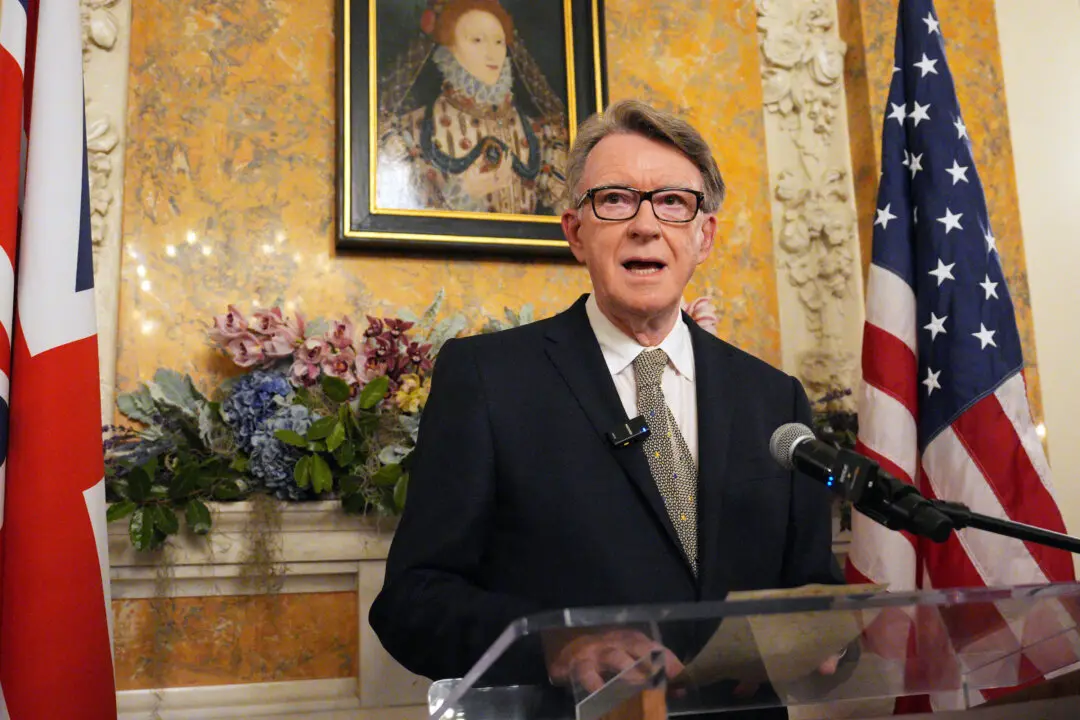Former Health Secretary Matt Hancock told the UK Covid-19 Inquiry that the monitoring systems for vaccine adverse reactions as well as their effectiveness were “effectively like a phase 4 trial.”
Answering questions on the rollout of the COVID-19 vaccinations, Hancock said, “We came to see the pharmacovigilence system as effectively like a phase 4 trial, as in, you did the first three phases, reached clinical evaluation, did the rollout across the population, but we kept essentially measuring the effectiveness of the vaccines right the way through.”
Hancock, who stepped down as a Conservative MP at the last general election, was making his fourth appearance before the long-running inquiry, chaired by Baroness Heather Hallett, on Thursday.
‘There Will Be Cases’
In the message exchange on Jan. 9, 2021, a month after the vaccine rollout began to much official fanfare, Whitty had replied: “Reasonable but needs to get better. There will be cases.”Morris asked Hancock what he thought Whitty had meant by “cases,” to which the former minister replied that it could have meant either that there would be adverse reactions to the vaccines or that there would still be cases of COVID-19 among the vaccinated.
He said that the government knew that cases of COVID-19 would still occur post-vaccination, “because there were in the clinical trials,” but that these “tended to be much milder.”
Asked about his use of the word “shonky,” Hancock said, “I was worried about the data collection systems and how that would be reported ... and as Chris Whitty went on to say, ’reasonable but needs to get better'.”
He said that the data collection systems, which included the Yellow Card system for reporting adverse reactions, had led to changes in recommendations around vaccination, such as the age groups offered the now-withdrawn AstraZeneca jab, which is currently the subject of High Court litigation under the Consumer Protection Act.
‘Valid and Safe and Saved Lives’
“Vaccines were valid and safe and saved lives,” he said, in response to questions from Leslie Thomas, KC, who represents the Federation of Ethnic Minority Healthcare Organisations.Thomas raised concerns from care workers about vaccine mandates, or the threat of them, which persuaded some health care staff to get vaccinated against their wishes, while some care workers were dismissed from their jobs.
Hancock told Thomas that the trade unions representing his clients had raised “illegitimate concerns” about the vaccines because those from ethnic minorities were statistically at a higher risk from COVID-19.
The government mandate requiring care home workers to take the vaccine never passed into law, but thousands of people left their jobs or were dismissed as a result of the threat, with ongoing industrial tribunals brought by some employees.
Questioned by lead counsel to the inquiry Hugo Keith, KC, Hancock said the UK was in “an excellent position” with regards to research and development of vaccines prior to the declaration of a pandemic in March 2020, but “not with respect to manufacturing.”

‘Segregated the Population’
Asked about “misinformation” on the vaccines, Hancock said, “We engaged early with the social media platforms, who rose to the challenge, and with the mainstream media, including the BBC.“But where we really learned from was the work that had been done to tackle misinformation around ISIS—Islamic State—because what the government learnt there is that if you directly disagree with an anti-vaxxer, all you do is amplify that anti-vaxxer’s view.”
Hancock added that the government had “segregated the population in terms of enthusiasm for vaccines,” with classifications ranging from “vaccine enthusiasts” to active “anti-vaxxers” who would try to persuade others not to take the jabs, with those deemed “vaccine hesitant” in the middle.
He said that in order to persuade as many “hesitant” people as possible to get vaccinated, government agencies had “brought in every part of the panoply of institutions that we could.”
“Her Majesty the Queen did not typically disclose her medical information, but she did disclose that she'd been vaccinated,” Hancock said, adding that he believed this had effectively persuaded many “hesitant” individuals to take the jabs.
Hancock was forced to stand down as health secretary in June 2021 after CCTV footage emerged of him kissing a colleague with whom he was having an extra-marital affair during a time of “social distancing” restrictions.
He was followed as a witness to the inquiry by an academic specialising in so-called “vaccine hesitancy,” Professor Heidi Larson, who was a member of the government’s Scientific Advisory Committee for Emergencies during the lockdown era.
Larson, the founding director of the Vaccine Confidence Project at the London School of Hygiene and Tropical Medicine, has also served as head of Global Immunisation Communication at UNICEF, a branch of the United Nations.
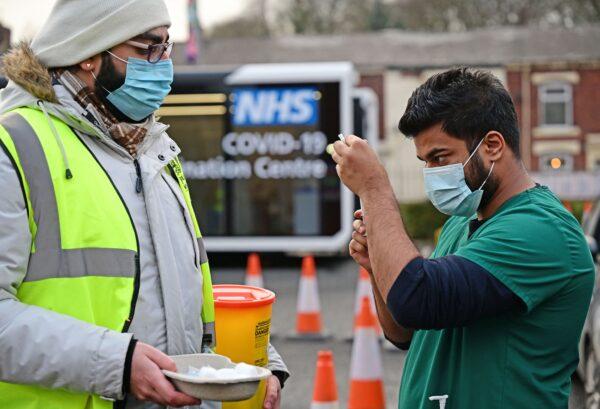
People ‘Resented’ Jab Coercion
“There was an explosion of dis- and misinformation” during the COVID-era, she said, adding that a large percentage of the population had never sought information on vaccines previously and had never come across the debates around their safety and effectiveness.Larson said the first pushback against vaccinations in the UK occurred following the 1853 Vaccination Act, when the government attempted to force children to take the smallpox jab, unless their parents could afford an exemption.
She noted this movement had similarities to many of the protests against COVID-19 jabs in that it was “not anti-vaccine really but anti-mandate.”
“Before COVID [people] didn’t have to think about vaccines,” she said, adding that prior to 2020, it had mostly been new parents, especially mothers, who had sought out information on their safety, but the majority had never given the matter much consideration.
“In a way there was too much information,” she said, adding this came from both official and non-official sources and from all corners of the internet, adding that many people had turned away from government and reported having low trust in health authorities in the wake of the lockdowns and the vaccine rollout.
Larson said of her work around surveillance and monitoring, “Of course, you need to see who’s taking vaccines and who isn’t.”
However, she added that coercion to get vaccinated appeared to have been counter-productive to the government’s aims, as many people were left feeling resentful that they had taken a new drug under duress, such as the threat of losing their job or not being allowed to travel.
“In the short-term it increased uptake, but in the long-term it increased distrust,” she said.
“They resented the fact that they had to get it,” she said, adding there was evidence that many people “resented or regretted having been coerced into taking a vaccine they hadn’t really wanted.”
Module 4 of the inquiry, examining the impact of vaccines and other drugs, is set to run until the end of January, with Whitty among those giving evidence on Monday.
